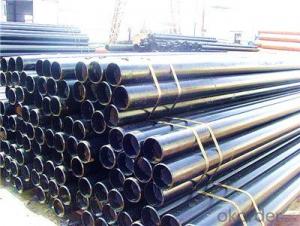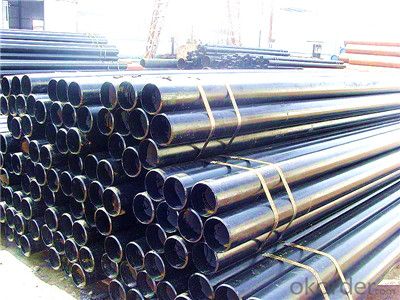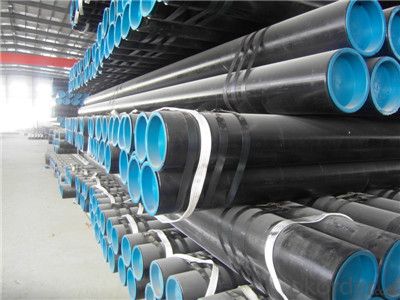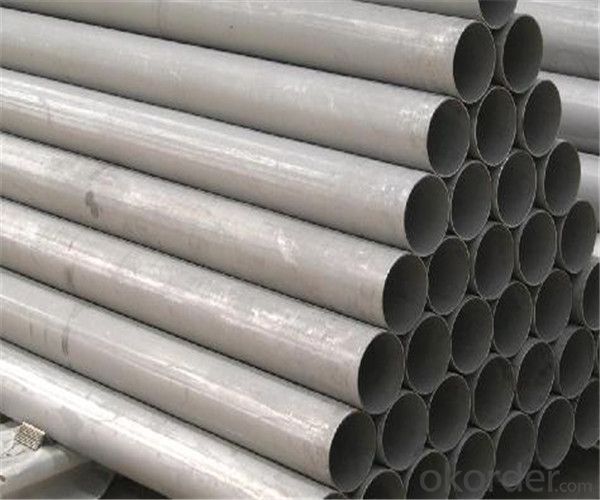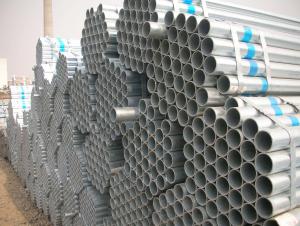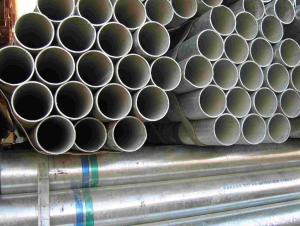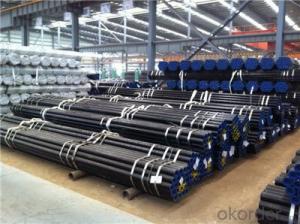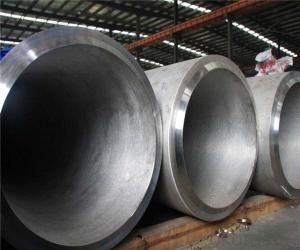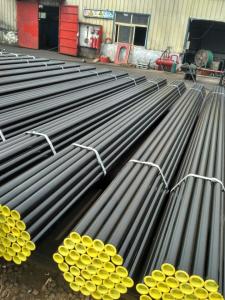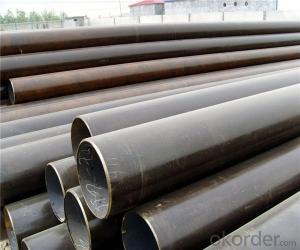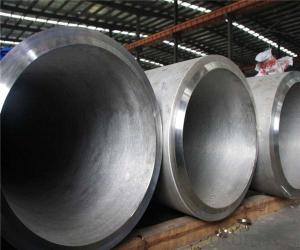High Quality Seamless Steel Pipe with Low Price from CNBM
- Loading Port:
- Tianjin
- Payment Terms:
- TT OR LC
- Min Order Qty:
- 100 m.t.
- Supply Capability:
- 200000 m.t./month
OKorder Service Pledge
OKorder Financial Service
You Might Also Like
PRODUCT DETAILS
1.Structure of Seamless Steel Pipe Description:
A large amount of Seamless Steel Pipes is offered to the clients at cost effective rates. These pipes are extremely durable, resistant to corrosion and have high tensile strength. Our pipes are used in nuclear plants, power plants, refineries and construction industry across the country. Furthermore, we are capable of providing these seamless pipes to the clients in bulk quantity.
2.Main Features of the Steel Pipe:
• High manufacturing accuracy
• High strength
• Small inertia resistance
• Strong heat dissipation ability
• Good visual effect
•Reasonable price
3.Packaging & Delivery:
| Packaging Details: | Seaworthy packages, bundles wrapped with strong steel strip |
| Delivery Detail: | 15-30 days after received 30% TT |
4.Seamless Steel Pipe Specification:
| Standard: | GB, DIN, ASTM,ASME, ASTM A106-2006, ASTM A53-2007 |
| Grade: | 10#,20#, 45#, 16Mn |
Thickness: | 8 - 33 mm |
| Section Shape: | Round |
| Outer Diameter: | 133 - 219 mm |
| Place of Origin: | Shandong, China (Mainland) |
| Secondary Or Not: | Non-secondary |
| Application: | Hydraulic Pipe |
| Technique: | Cold Drawn |
| Certification: | API |
| Surface Treatment: | factory state or painted black |
| Special Pipe: | API Pipe |
| Alloy Or Not: | Non-alloy |
| Length: | 5-12M |
| Outer Diameter: | 21.3-610mm |
5.Product pictures
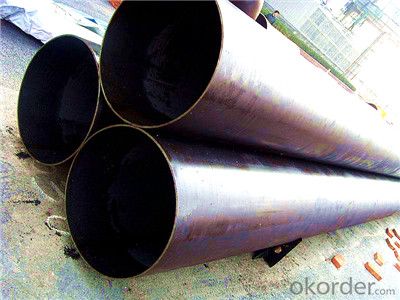
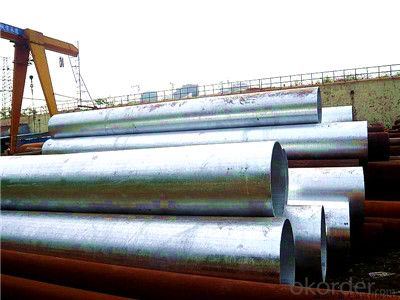
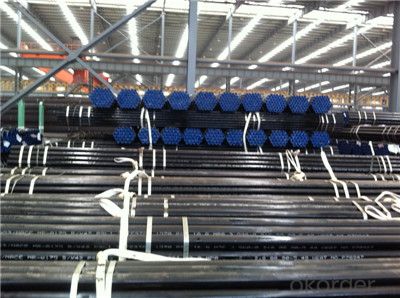
5.FAQ of Seamless steel pipe:
①How is the quality of your products?
Our products are manufactured strictly according to national and internaional standard, and we take a test
on every pipe before delivered out. If you want see our quality certifications and all kinds of testing report, please just ask us for it.
Guaranteed: If products’ quality don’t accord to discription as we give or the promise before you place order, we promise 100% refund.
②How about price?
Yes, we are factory and be able to give you lowest price below market one, and we have a policy that “ for saving time and absolutely honest business attitude, we quote as lowest as possible for any customer, and discount can be given according to quantity”,if you like bargain and factory price is not low enough as you think, just don’t waste your time.Please trust the quotation we would give you, it is professional one.
③Why should you chose us?
Chose happens because of quality, then price, We can give you both.Additionally, we can also offer professional products inquiry, products knowledge train(for agents), smooth goods delivery, exellent customer solution proposals.Our service formula: good quality+good price+good service=customer’s trust.
SGS test is available, customer inspection before shipping is welcome, third party inspection is no problem.
Any question, pls feel free to contact us !
- Q: Can steel pipes be recycled?
- Yes, steel pipes can be recycled. Steel is one of the most commonly recycled materials in the world, and steel pipes can be melted down and reused to make new steel products. Recycling steel pipes helps conserve natural resources and reduces the environmental impact of manufacturing new steel.
- Q: Are steel pipes resistant to corrosion?
- Yes, steel pipes are generally resistant to corrosion due to their composition, which includes a protective layer of zinc or other anti-corrosion coatings. However, factors such as exposure to harsh environments or chemicals can affect the level of corrosion resistance.
- Q: How do steel pipes perform in high-temperature environments?
- Steel pipes perform well in high-temperature environments due to their excellent heat resistance properties. They can withstand elevated temperatures without losing their structural integrity or strength. Additionally, steel pipes have low thermal expansion, which reduces the risk of deformation or cracking under extreme heat. This makes steel pipes a reliable choice for various applications in industries such as oil and gas, power generation, and chemical processing, where high temperatures are common.
- Q: What is the difference between internal coating and external lining of steel pipes?
- Steel pipes can be protected from corrosion and damage through two different methods: internal coating and external lining. When it comes to internal coating, a protective layer or coating is applied to the inner surface of the steel pipe. This is done to prevent corrosion or damage caused by the fluid or substance being transported through the pipe. Common materials used for the coating include epoxy, polyurethane, or polyethylene. These materials create a barrier between the pipe and the transported material, thus extending the pipe's lifespan and preserving the quality of the transported material. On the other hand, external lining involves applying a protective layer or lining to the outer surface of the steel pipe. The purpose of this is to shield the pipe from external elements like soil, moisture, chemicals, and physical damage. Materials such as polyethylene, polypropylene, or fusion-bonded epoxy are typically used for the external lining. By acting as a barrier, the lining prevents corrosive substances from coming into contact with the pipe and causing harm. Additionally, it helps maintain the pipe's structural integrity and prevents the formation of leaks or cracks. To summarize, the main distinction between internal coating and external lining of steel pipes lies in where the protective layer is applied. Internal coating focuses on the inner surface of the pipe, while external lining concentrates on the outer surface. While both methods aim to safeguard the pipe from corrosion and damage, they address different aspects of pipe protection.
- Q: Can steel pipes be used for transporting hazardous materials?
- Yes, steel pipes can be used for transporting hazardous materials. Steel pipes are known for their strength, durability, and resistance to corrosion, making them suitable for handling various types of hazardous substances. Additionally, steel pipes can be designed to meet specific requirements, such as pressure ratings and chemical compatibility, ensuring the safe transport of hazardous materials. However, it is crucial to consider additional safety measures and comply with relevant regulations to minimize any potential risks associated with transporting hazardous materials.
- Q: What are the different grades of steel pipes?
- The different grades of steel pipes vary based on their chemical composition and physical properties. Some commonly used grades include carbon steel pipes (grades A, B, and C), alloy steel pipes (grades P1, P5, P9, and P11), stainless steel pipes (grades 304, 316, and 321), and duplex steel pipes (grades 2205 and 2507). Each grade offers specific characteristics suited for different applications and industries.
- Q: What is the role of steel pipes in the transportation of liquefied natural gas (LNG)?
- Steel pipes play a vital role in the transportation of liquefied natural gas (LNG) due to their unique properties and characteristics. LNG is a form of natural gas that has been cooled to a liquid state for ease of transportation and storage. The transportation of LNG requires specific infrastructure, and steel pipes are an essential component of this infrastructure. Firstly, steel pipes are used in the construction of LNG terminals and liquefaction plants. These facilities are responsible for converting natural gas into its liquid form and storing it before transportation. The extreme cold temperatures required to maintain LNG in its liquid state necessitate the use of materials that can withstand these conditions, and steel pipes are well-suited for this purpose. Steel pipes have excellent strength and durability, making them capable of handling the low temperatures and high pressures involved in the liquefaction and storage processes. Secondly, steel pipes are used in the transportation of LNG from the liquefaction plants to the storage tanks or shipping vessels. LNG is typically transported over long distances, either through pipelines or via specialized LNG carriers. Steel pipes are used in the construction of underground or above-ground pipelines, providing a reliable and safe means of transporting the LNG. The pipes must be able to maintain the low temperatures of the LNG while withstanding the pressures and stresses associated with the transportation process. Steel pipes offer the necessary strength, corrosion resistance, and thermal properties to ensure the safe and efficient transportation of LNG. Lastly, steel pipes are also used in the construction of storage tanks for LNG. These tanks are designed to maintain the LNG in its liquid state until it is ready for use or further transportation. The tanks are often constructed using a combination of steel plates and steel pipes. Steel pipes are used to connect the various components of the tank, such as the inner and outer shells, reinforcing the structural integrity of the tank and ensuring its ability to withstand the extreme conditions to which it is subjected. In summary, steel pipes play a crucial role in the transportation of liquefied natural gas (LNG) due to their strength, durability, and ability to withstand low temperatures and high pressures. From the construction of LNG terminals and liquefaction plants to the transportation through pipelines or on specialized vessels, steel pipes are a vital component of the infrastructure required for the safe and efficient transportation and storage of LNG.
- Q: Can steel pipes be used for gas lines?
- Yes, steel pipes can be used for gas lines. Steel pipes are commonly used for gas lines due to their high strength and durability, making them suitable for transporting natural gas or propane safely and efficiently.
- Q: Are steel pipes suitable for underground cable protection?
- Indeed, underground cable protection can be achieved through the use of steel pipes. These pipes boast remarkable durability and strength, rendering them an optimal choice for safeguarding cables against external elements such as physical harm, wetness, and corrosion. They are capable of enduring the soil's weight and any potential pressure from above, guaranteeing the cables' security and protection. Furthermore, steel pipes can be effortlessly welded or connected to establish a continuous and flawless conduit, thereby bolstering their efficacy in underground cable protection.
- Q: How do steel pipes handle chemical substances?
- Steel pipes are highly resistant to chemical substances due to their high strength and corrosion-resistant properties. They can safely handle a wide range of chemical substances without undergoing any significant degradation or damage.
Send your message to us
High Quality Seamless Steel Pipe with Low Price from CNBM
- Loading Port:
- Tianjin
- Payment Terms:
- TT OR LC
- Min Order Qty:
- 100 m.t.
- Supply Capability:
- 200000 m.t./month
OKorder Service Pledge
OKorder Financial Service
Similar products
Hot products
Hot Searches
Related keywords
